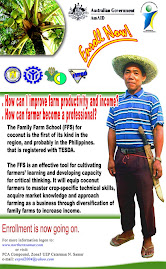- The Family Farm School (FFS) for coconut is the first of its kind in the region, and probably in the Philippines’, that is registered with TESDA. It came into being as a determined response to the problems that beset the province: i) current educational system focuses on formal education and partial to urban dwellers, ii) few economic opportunities for employment and self-employment of farmers, iii) agricultural productivity remains low and subsistence, and iv) stigma of rural life and farm labor is viewed as a lower form of wealth generation.
- The FFS is an effective tool for cultivating farmer learning and developing capacity for critical thinking. It will equip coconut farmers to master crop-specific technical skills, acquire market knowledge and approach farming as a business through diversification of family farms to increase family income.
- The goal of the FFS is to produce and empower skilled graduates of coconut production and processing who can be employed with corporate farms, or be self-employed. For self-employment, crop diversity of family farms will be promoted as one way to redesign the farming system, i.e., introducing a range of crops and/or ruminants to ease the coconut farms from price fluctuations of a single cropping system, a common practice of farmers in Northern Samar.
- Of strategic importance to the province and the region is that the School is regarded by many as the locus of “Knowledge on Coconut”. Over these years there were no initiatives made to give special attention to the coconut farmers and their families as the tillers of coconut. The farm, therefore, will be the focal to pilot-test (on-farm) and introduce innovative, yet suitable coconut-based farming system. Together, the students and their parents will develop the farm, with technical backstopping of the FFS technicians.
Back to HOMEPAGE

